UN Conference To Tackle Ocean Risks And 'Emissions Gap' Amid Global Climate Movement
To act at the scale of the climate emergency, the parliament needs to push for real, immediate action
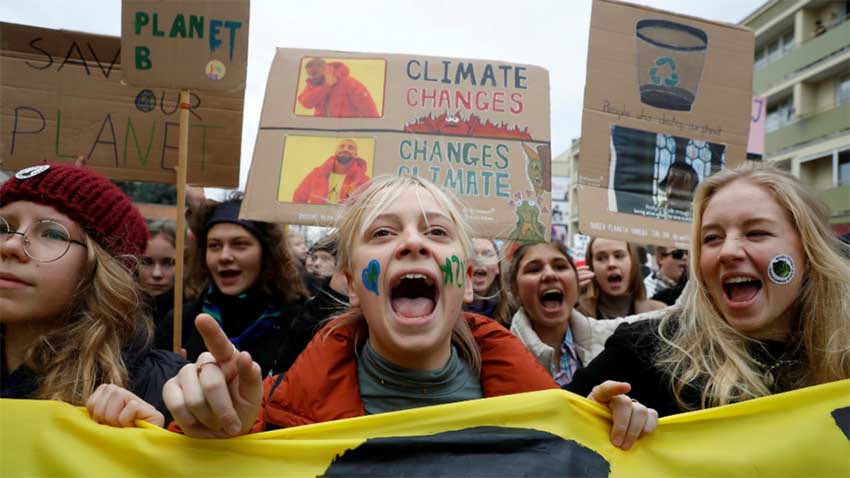
Activists chant during a demonstration in Warsaw, Poland on November 29, 2019 that aligned with global protests for climate action. Photo Credit : Kacper Pempel/REUTERS
Global leaders, activists and scientists from nearly 200 countries will gather in Madrid on Monday for the start of the UN Climate Change Conference (COP 25) where they will review and finalise goals set out in the much-lauded Paris Agreement of 2015.
Overshadowing the talks will be the failures of forums past to transform rhetoric into policy change, making the stakes at this year’s event even higher as UN Secretary-General António Guterres warned leaders of "a point of no return".
A UN report released this week concedes that even if greenhouse gas emissions are cut to meet Paris Agreement levels, global temperatures will rise 3.2 degrees Celsius, exceeding the 1.5 degrees aim of the accord.
Such a rise would be insufficient to avert the worst effects of climate change.
This time round, delegates of the conference are being held to a higher standard. They will be watched by a global climate strike movement, inspired by activist Greta Thunberg, that has mobilised millions of people in cities and regions, across generations and on an unprecedented scale to demand government action.
FRANCE 24 takes a look at some of the obstacles and policies expected to shape the agenda at this year's 12-day conference in Madrid :
‘No-shows’ for Trump and Bolsonaro
Under President Donald Trump’s administration, the US has backpeddled on its commitment to address global environmental issues, and last month began withdrawing from the Paris Agreement, a major blow to the fight against climate change.
Trump will not attend COP 25. The US delegation will be led by Democratic Congresswoman and House Speaker Nancy Pelosi.
So far, there has been little evidence that the US can be brought back into the global green fold. Trump skipped the G7 summit’s climate change event in August, and made a short visit to the UN Climate Action Summit in New York in September, without speaking at its organised climate session.
Brazilian President Jair Bolsonaro will also be a no-show. Originally billed to host the UN climate summit this year, Brazil backed out shortly after Bolsonaro's election. Despite devastating fires and environmental deregulations that have destroyed almost 10,000 square kilometres of the Amazon’s virgin rainforest, Brazil's leader has continued to deny global warming, calling it a Marxist hoax and even appointing climate skeptics to key cabinet posts.
Recently, Germany’s Potsdam Institute for Climate Impact Research warned that the world is heading for several “tipping points” that could acutely quicken the pace of climate change. The Amazon deforestation, along with the decline of ice sheets in Greenland and Antarctica, are among the key events cited.
A ‘European Green Deal’
In the EU, however, there is change afoot and not only because of a rotation of leadership.
"I want Europe to become the global leader of the green movement," said the new head of the European Council, Charles Michel, aligning with new European Commission President Ursula von der Leyen's commitment to tackle climate change including the proposal of a “European Green Deal”.
For its part, the EU Parliament last week declared a ‘climate and environment emergency’. Although a symbolic gesture just ahead of COP 25, its decision to use the word ‘emergency’ acknowledges that the time to act is running out.
The declaration follows the parliament’s endorsement of a new European Commission, whose chief von der Leyen pledged the launch of a European Green Deal within her first 100 days to transform the EU bloc’s economy into a low-carbon one. This would include the introduction of a new carbon tax to be imposed at Europe’s borders. Von der Leyen has also demanded that EU member states commit to cutting emissions by 55 percent by 2030.
Environmental groups, including many Green MEPs however, are sceptical about whether von der Leyen’s green deal will go far enough.
"Declaring an emergency is important, but any such statement needs to be followed by emergency action," said Wendel Trio, director of the Climate Action Network Europe in an interview with AFP.
"To act at the scale of the climate emergency, the parliament needs to push for real, immediate action," he said.
"The EU needs to increase the climate target to at least 65 percent emission cuts, and adopt policies and measures that can reduce emissions immediately."
French President Emmanuel Macron, one of the EU’s putative leaders, has shown zeal for sweeping reforms and pushed boundaries for change, including on environmental issues.
But while he's received international applause for his progressive stance on climate action, Macron has had a more challenging time on the domestic front. His now-defunct tax hikes on fuel were part of a bold program that backfired, spawning the Gilets Jaunes (Yellow Vests) protest movement and leaving his political credibility damaged.
It remains a cautionary tale for governments contemplating climate reforms.
Now with a changing of the guard at the upper echelons of the EU, Macron is unlikely to be going it alone in testing the political and public appetite for green reforms, or in contending with the political costs.
Economics analyst Xavier Timbeau told the French newspaper La Croix that the COP 25 will be an opportunity for European leaders to steer towards a more ambitious agenda.
“An important signal to look out for will be Europe’s attitude in international negotiations, particularly during COP 25. Europe will have the opportunity if it really wants to, to assert its role as a diplomatic and technological leader in environmental matters on a global scale,” Timbeau said.
COP 25 aka the ‘Blue COP’
Dubbed the ‘Blue COP’ because of its emphasis on oceans, the Madrid event will address marine degradation and biodiversity risks to the oceans.
At negotiations for the Paris Agreement, the world’s oceans were “not present at all…they were a side event,” said the EU Commissioner for Environment, Maritime Affairs and Fisheries at last month’s Our Ocean 2019 conference in Norway.
Participants at this year’s talks, including Chile, a key advocate for the adoption of global measures to protect oceans, are keen to change that. Chile, which backed out of hosting COP 25 because of ongoing protests in its capital, will push for its joint proposal with Argentina to create a marine protection area (MPA) in Antarctica.
“I expect that the focus on the ocean at COP 25 will be maintained regardless of the change of venue,” said Rémi Parmentier, coordinator of Because the Ocean – an initiative comprising more than 30 countries, including Chile and Spain, to bring the ocean into climate change policy.
According to findings from the Intergovernmental Panel on Climate Change (IPCC), an estimated 600 million people will be directly impacted by rising sea levels due to global warming, while changes in ocean temperature are already reducing the number of fish and marine species, putting food security in certain regions at risk. Marine protection areas are among the recommendations of the panel’s report.
Revised emissions targets could come at COP 26
Even while COP 25 gets underway, many are already talking about next year’s meeting in Glasgow, Scotland, where Paris emissions targets will need revision. The UN's findings, entitled the Emissions Gap Report 2019, state that emissions must fall by 7.6 percent per year up to 2030 to keep the planet on track to limit a temperature rise to 1.5 degrees Celsius above pre-industrial levels.
The UK’s former clean growth minister Claire Perry O’Neill, who was named president for next year’s conference, will be attending COP 25 in Madrid.
-

Moldovan youth is more than ready to join the EU
2024-04-18 -

UN says solutions exist to rapidly ease debt burden of poor nations
2024-04-18 -

'Human-induced' climate change behind deadly Sahel heatwave: study
2024-04-18 -
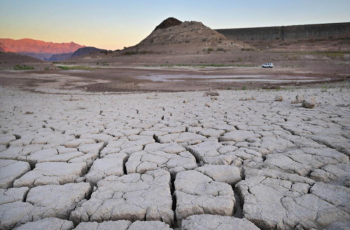
Climate impacts set to cut 2050 global GDP by nearly a fifth
2024-04-18 -
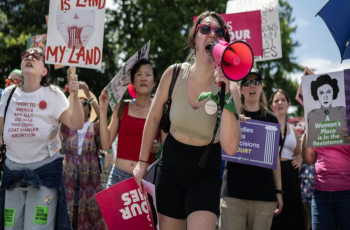
US sterilizations spiked after national right to abortion overturned: study
2024-04-13 -

Future of Africa's flamingos threatened by rising lakes: study
2024-04-13 -
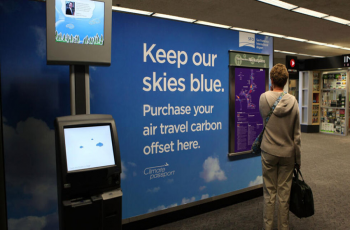
Corporate climate pledge weakened by carbon offsets move
2024-04-11 -
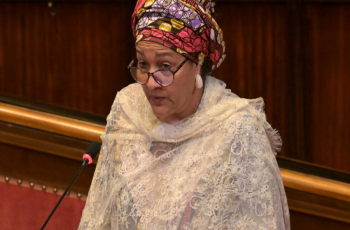
Humanity lost 'moral compass' on Gaza: top UN official
2024-04-10 -

No.1 Scheffler says patience and trust are secrets to success
2024-04-10 -

From homeless addict to city chief: the unusual journey of Canadian mayor
2024-04-10
